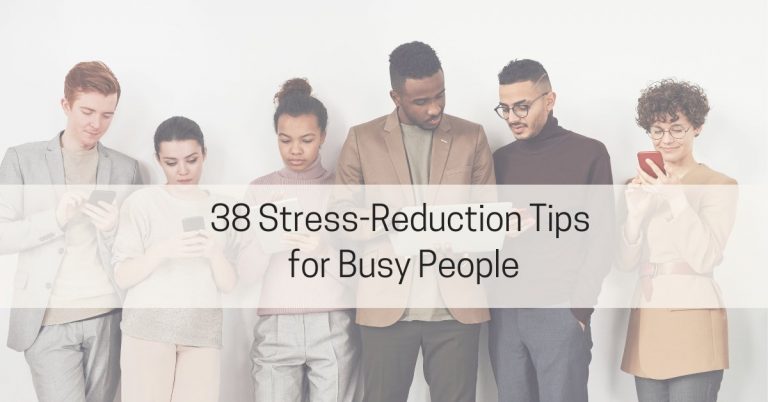
Stress is a normal part of life, but too much stress can take a toll on our physical and mental health. The good news is that stress management doesn’t have to be time-consuming or complicated. In this article, you’ll learn a variety of quick and simple stress-reduction tips.
What is Stress?
Stress is a feeling of being overwhelmed or unable to cope with the demands of a situation. It can be caused by a variety of factors, both internal and external.
Internal factors include things like your thoughts, emotions, and physical health. For example, if you’re worried about a job interview or have a lot of things on your mind, you may feel stressed. Or, if you’re not getting enough sleep or have a chronic health condition, you may also be more likely to experience stress.
External factors are things outside of your control, such as work deadlines, relationship problems, or financial difficulties. These types of stressors can be just as difficult to cope with as internal stressors.
When you’re stressed, your body releases hormones that prepare you to deal with the threat. This is known as the “fight-or-flight” response. Your heart rate and blood pressure increase, and your muscles tense up. This can be helpful in short-term situations, such as when you need to avoid danger or meet a deadline. However, if stress is chronic, it can lead to a variety of health problems, such as heart disease, stroke, and depression.
Symptoms of stress
- Physical symptoms: headaches, muscle tension, stomach upset, fatigue, difficulty sleeping
- Emotional symptoms: irritability, anxiety, depression, difficulty concentrating
- Behavioral symptoms: overeating, undereating, substance misuse, isolating
Tip: We’re all different. So, notice what symptoms of stress you experience. And notice what situations or people tend to feel stressful. This information can help you avoid stressful situations or address stress proactively.


Ways to Relieve Stress Quickly
These strategies can help you relieve stress in less than 10 minutes and most are things that adults and teens can do. These stress-relievers aren’t going to solve your problems or eliminate the sources of your stress. However, they can help you calm your nervous system and from a place of calm, you’ll be better able to problem-solve and identify longer-term solutions.
- Listen to your favorite music
- Get some fresh air
- Stretch or do some yoga poses
- Do a grounding exercise
- Disconnect from technology
- Talk to someone supportive
- Look at photos that make you smile
- Meditate
- Squeeze a stress ball
- Read for pleasure
- Walk, bike, or skateboard around the block
- Count to 10 slowly and repeat
- Dance
- Journal
- Write down 10 things you’re grateful for
- Doodle, draw, color, or Zentangle
- Chew a piece of gum
- Watch a funny video on YouTube
- Sit in the sun
- Punch a pillow
- Read an inspirational quote
- Spend time with your pets
- Knit or crochet
- Take a shower
- Do 20 jumping jacks
- Do something nice for someone else
- Hug a loved one
- Visualize a safe, comforting place
- Pick some flowers (or pinecones or leaves or seashells or rocks)
- Give yourself a neck massage
- Kick a soccer ball
- Diffuse essential oils or use scented lotions or candles
- Slow, deep breathing
- Savor a cup of decaffeinated tea or coffee
- Repeat a mantra
- Do a progressive relaxation exercise
- Tend your garden; water and talk to your plants
- Make a list of your worries and identify which you can do something about


I find it helpful to use a variety of stress-reduction strategies. For example, you may need to use different strategies when you are at work versus when you’re at home. Sometimes, time and space may limit your stress management strategies.
Tip: Choose 5-10 stress reduction tips from the list or strategies that have worked for you in the past. Write them down, list them in your phone’s notes app, make a voice recording, or make a screen saver that lists your strategies. The key is to have your list handy so you don’t have to come up with healthy coping strategies when you’re feeling stressed and overwhelmed.
Remember, the more you practice using these stress-reduction tips, the more automatic they will become.
©2023 Dr. Sharon Martin, LCSW. All rights reserved. Photos courtesy of Canva.com.


Do you have trouble “turning off” your mind?
Do your thoughts race making it hard for you to relax or stay focused on the present?
Do you ruminate about mistakes or perceived inadequacies?
Is it hard for you to make decisions because you don’t want to make the wrong choice?
Start changing your thoughts today with this digital toolkit!
Source:Dr. Sharon Martin , www.livewellwithsharonmartin.com, 2023-10-12 23:03:39
Source Link